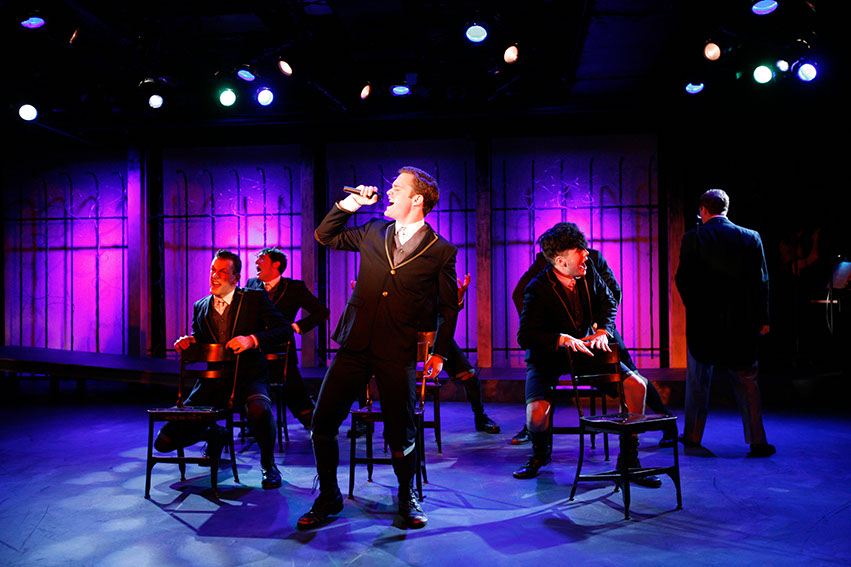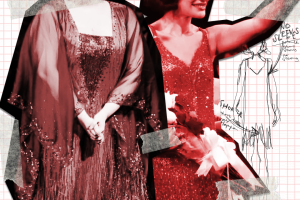Is ‘Spring Awakening’ Still Relevant 15 Years Later?
The story and history behind the play and musical converse with current issues in multiple ways.
COURTESY OF OTTERBEIN UNIVERSITY THEATRE AND DANCE VIA WIKIMEDIA COMMONS
The themes in “Spring Awakening” about liberal thinking be a threat to the Church are still relevant today.
October 18, 2022
If someone came up to you and told you they had seen a play about abortion, rape, liberal thinking being seen as a threat to the Catholic Church, and suicide, you would probably assume that this play was written fairly recently about heavily debated issues of today. Would you believe me if I said that these were actually the plot points of the 1891 play “Spring Awakening”?
In 1906, Frank Wedekind rocked the world with the first staged production of his play “Frühlings Erwachen” (translated to “Spring Awakening” in English). One century later, in 2006, the musical adaptation of Wedekind’s play premiered, soon becaming a cultural phenomenon. The musical continued to defy even the norms of Broadway with its score composed of rock music.
“Spring Awakening” tells the story of 19th-century German teenagers on the brink of puberty. Despite their changing minds and bodies, the adults around them refuse to educate them on the taboo topics of sex and puberty and instead force the adolescents to suppress their confusion and internal conflicts, causing them to live in tormented ignorance.
I am a huge fan of the show and had the chance to watch a filmed performance of the original production at the New York Public Library for the Performing Arts at Lincoln Center. It was an especially memorable moment since I had to get special permission from the director of the original Broadway production of “Spring Awakening,” Michael Mayer, to access the viewing.
In light of the 15-year revival concert last year and the recently released HBO documentary on the musical, “Spring Awakening: Those You’ve Known,” I wanted to see if the “controversial” content still holds up or if it is still relevant.
The protagonist of the show, Melchior (Jonathan Groff), shares the same views of society that Wedekind did in the 19th century, which were that the Church — and subsequently the adults who follow their teachings religiously (no pun intended) — purposefully restricts information given to the children so as not prompting them to ask questions and doubt their beliefs.
Melchior’s views are most apparent in the song “All That’s Known,” where he sings: “But I know there’s so much more to find / Just in looking through myself, and not at them / Still, I know to trust my own true mind / And to say, ‘There’s a way through this.’”
Unlike when the play was written, we now try to prioritize and shift focus onto mental health to alleviate the issue.
He is the only character who is an atheist and tries to learn more than what is told to him by the adults. Melchoir then has to watch as his friends succumb to the traps placed by those adults who blindly follow the ideology of the Church. Ultimately, his attempts to help “set free” his friends from the grasp of religious thinking only result in the death of his best friend, Moritz (John Gallagher Jr.), and lover, Wendla (Lea Michele).
While Melchior is aware of the injustices within their educational system and religious upbringing, Moritz and Wendla are not. Both are victims of the forced ignorance placed upon them by the adults, and as a result, they suffer throughout the entire musical from confusion — and added confusion about why they are confused.
When the audience first meets Moritz , he is being berated by his teacher for a simple mistake he made in class. He confesses to Melchior that he has been unable to focus due to lack of sleep, caused by erotic dreams. Despite the dreams being out of his control, he feels completely alone and believes he is to blame. It all comes to a head just before the end of Act 1, Moritz is informed that he will not be promoted in school come fall — despite knowing that he passed his midterms, and the audience knowing that the teachers are failing him just because they can.
When Moritz tells his father the news, his dad can only think about how this will be a bad reflection on him and his wife — “So, now, what are your mother and I supposed to do? You tell me, Son. What? How can she show her face at the Missionary Society? What do I tell them at the Bank? How do we go to Church? What do we say? My son. Failed.”
Feeling like his future is hopeless, Moritz kills himself. This is included in the 1891 play, when the average suicide rates for males is West Germany (where Wedekind lived when he wrote “Spring Awakening”) was about 23%. Meanwhile, today in 2022, 14.2 in every 100,000 teens ages 15-24 commit suicide, according to the Centers for Disease Control. Unlike when the play was written, we now try to prioritize and shift focus onto mental health to alleviate the issue.
Finally, in the last 20 or so minutes of the show, an event occurs that is just as controversial if not even more today: Wendla’s abortion.
Wendla’s plot in the musical follows her wanting to learn more about her sexuality but being forced to conform to the Church’s views on celibacy and prevent premarital sex. However, this backfires when Wendla has sex with Melchior (or, in Wedekind’s play, is raped by Melchior) and becomes pregnant.
Like Moritz’s father, Wendla’s mother is only concerned with how it looks on her — “What have you done? To yourself? To me?”
Even when the musical premiered in 2006, its themes were still considered “progressive” topics. Although many still call them “controversial,” it continues to be our reality.
To save her own reputation, she takes Wendla to a back-alley abortionist to end the pregnancy, ultimately killing her. This topic still sparks controversy today with the recent overturning of the landmark Supreme Court case Roe v. Wade, which protected a woman’s right to an abortion under the 14th Amendment.
Wedekind told a cautionary tale of censorship, rape, suicide and abortion — and he himself was censored from telling the story because it was deemed “too inappropriate.” His first staged production of his play was not until 1906 in Berlin, and brought to New York in 1917 with its first production in English. It was closed after just two nights due to its obscenity and boarding pornography. A 1917 article from the New York Times wrote that “The play in its entirety is unpresentable in the theatre, even in the land to which it was peculiarly addressed, and certainly there is no shadow of an excuse for the present tasteless production of a badly translated version called ‘The Awakening of Spring.’”
He wrote a play with incredibly radical subjects that seemed obscene and obscure for his time that now, 131 years later, are exactly what we are living. Although underdiscussed in Wedekind’s time, they are issues that we are actively dealing with today.
Even when the musical premiered in 2006, its themes were still considered “progressive” topics. Although many still call them “controversial,” it continues to be our reality. They shape our politics, our mindsets and our values. We hear about these topics in our day-to-day life, and many will experience one or more of them themselves — which is exactly why we need to continue to talk about them. Both the play and the musical opened eyes that led us to today.
Since “Spring Awakening” closed in 2009, there have been three mainstream productions (excluding tours, concerts and international productions): a three-month run in London in 2009, a limited West End revival in 2021, and a 2015 revival on Broadway presented by Deaf West Theatre. The Broadway revival combined hearing, deaf, and hard-of-hearing actors to put on the show, incorporating American Sign Language into the choreography.
In 2008, Richard Zoglin wrote for Time Magazine about the revival of the musical “Hair,” saying that “Today ‘Hair’ seems, if anything, more daring than ever.” I believe the same can be said about “Spring Awakening”.















